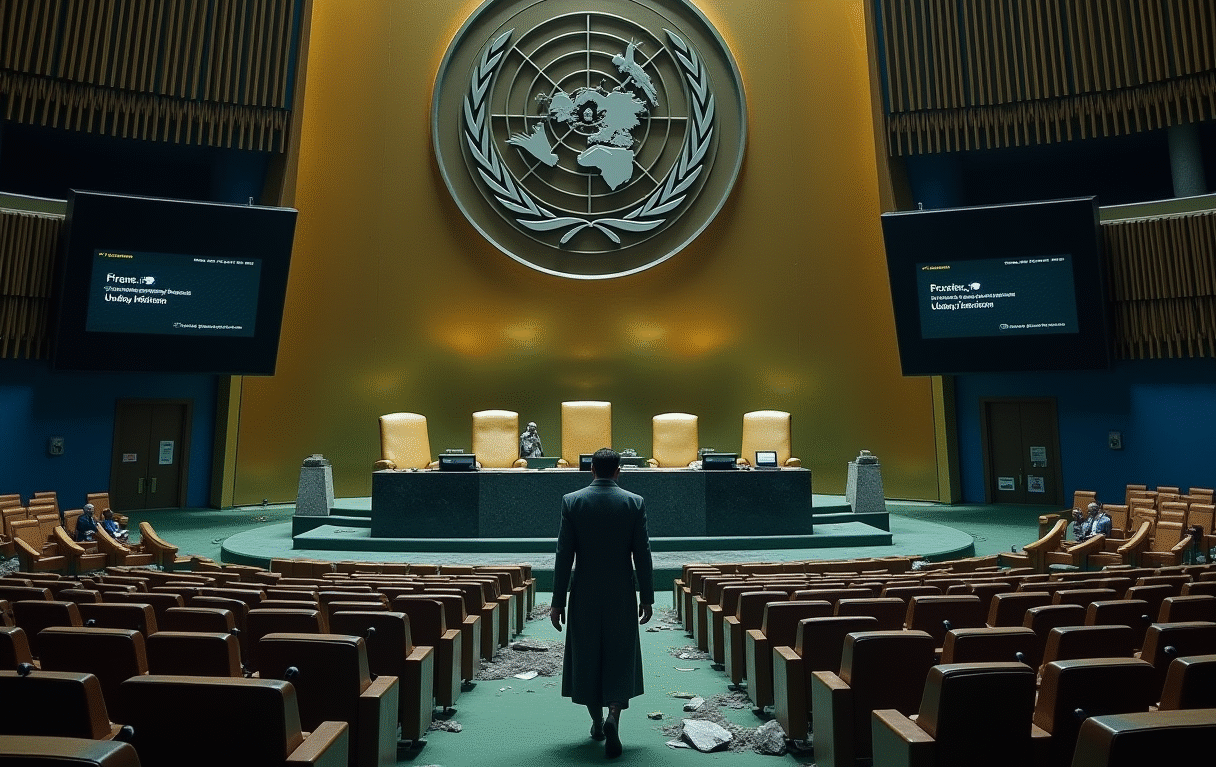An Eidoist Critique of Recognition-Based Order
The postwar global order—centered on the United Nations—was built on the ashes of catastrophe. It aimed to prevent another world war by anchoring peace in multilateral cooperation, universal rights, and the rule of law. But this vision contained its own contradiction: the very structure meant to ensure equality and peace placed supreme power in the hands of five nations—the permanent members (P5) of the UN Security Council—with veto power to block any substantive action.
That veto has rendered the UN structurally paralyzed. When one of the P5 becomes the aggressor—as with Russia’s invasion of Ukraine—or when geopolitical interests clash, the system becomes impotent. The UN cannot protect, enforce, or restrain. It becomes a theater of condemnation, not a tool of resolution.
More broadly, global governance today has descended into performance diplomacy: symbolic gestures, empty resolutions, and climate summits designed more for applause than structural transformation. The global stage, once envisioned as a platform for shared order, now reflects a deeper truth: no system built on the pursuit of recognition can remain stable.
Eidoism’s Diagnosis: The Recognition Loop
Eidoism offers a radical departure from all existing paradigms of international relations. It rejects the belief that order can be maintained through balance of power, soft law, or economic interdependence alone. Instead, it identifies the psychological engine beneath all systemic failure: the loop of recognition.
Recognition—social validation, status, applause—is the unspoken currency of global action. States seek visibility, leaders crave legacy, and institutions perform virtue not to enforce structure but to enhance their symbolic capital. This loop distorts priorities, escalates conflict, and hollows out functionality.
Eidoism proposes that no durable global order can exist until this loop is seen and dismantled. The problem is not sovereignty. The problem is the performance of sovereignty for recognition.
Why the UN Cannot Escape the Loop
The United Nations, by design, was meant to be impartial and universal. But in practice, it mirrors the same recognition-driven dynamics it was meant to transcend. It relies on:
- The consent of the powerful (especially the P5)
- Voluntary funding from states seeking influence
- Symbolic gestures to maintain public legitimacy
Its peacekeeping missions require approval from the very actors it might need to restrain. Its climate programs rely on funding from the very powers that undermine climate agreements. Its resolutions are diluted for consensus or blocked outright.
Thus, the UN becomes a stage for visible action, not a structure of invisible coherence. It functions only when its actions are applauded—not when they are necessary. This is the fatal flaw Eidoism seeks to address.
Eidoism’s Alternative: Form Without Applause
Eidoism does not seek to replace the UN with another institution. It proposes a deeper restructuring of how systems are built, rooted in the principle of form: a structural fit between function, scale, and necessity. Form, unlike recognition, does not need to be seen. It needs only to work.
Eidoism calls for a post-recognition global order that prioritizes:
- Structural coherence over symbolic visibility
- Decentralized micro-pacts tailored to specific problems rather than grand universal declarations
- Invisible coordination mechanisms—algorithmic, modular, non-performative
- Quiet institutions that solve without spectacle
- Minimal interventions guided not by moral drama but by form-based necessity
This order would be polycentric, non-ideological, and psychologically self-aware. It would see nations not as performers but as structural nodes. It would abandon the theater of global morality in favor of silent alignment with ecological, economic, and cognitive form.
The Prerequisite: Inner Reform Before Global Reform
Eidoism asserts that no global order can be restructured unless the individual mind is restructured first. As long as political actors, diplomats, and citizens remain locked in the loop of recognition—seeking applause, visibility, and validation—any system will devolve into performance.
Thus, the path forward begins not with treaties or institutions, but with the internal exit from the recognition loop. Individuals must be trained to:
- Detect when they act for image rather than form
- Withstand the discomfort of invisibility
- Anchor motivation in fit, not feedback
Only then can they build systems that do not collapse under their own desire to be seen.
Does the World Need a World Government and Police?
The idea of a world government arises whenever global threats—climate collapse, war, pandemics—demand unified action. The logic is simple: fragmented nations cannot solve planetary problems. A central authority with enforcement power could ensure coordination and prevent chaos.
But with that comes danger. A world government could just as easily become a monopoly of control—a surveillance state, a moral empire, a hegemon immune to resistance. A global police force may stop war but also crush dissent, erase difference, and normalize obedience. Power, once centralized, rarely restrains itself.
Eidoism rejects both chaos and empire. It proposes distributed form: coordination without domination, structure without spectacle. Not a superstate, but scalable, modular systems built on fit—not applause. Governance that doesn’t need to be seen to work.
Will the world end in one government? Possibly. But without inner reform—without escaping the loop of recognition—it won’t be peace. It will be silence imposed, not coherence achieved.
The final government won’t end history. It will only end choice.
Eidoism: Beyond the United Nations
The United Nations will survive, but only as a symbol—not a sovereign force. Without military capacity, and with its core organs subject to hegemonic veto, it cannot enforce peace, equity, or law. At best, it will become a stage-managed NGO for global visibility.
Eidoism offers something else: a non-theatrical world, where coordination does not require applause, and structure does not depend on charisma. A world where the logic of form replaces the loop of recognition. In such a world, the global order would no longer need to perform to be legitimate—it would be legitimate by function.
This is the world Eidoism sees. Not as utopia, but as structural sanity.


